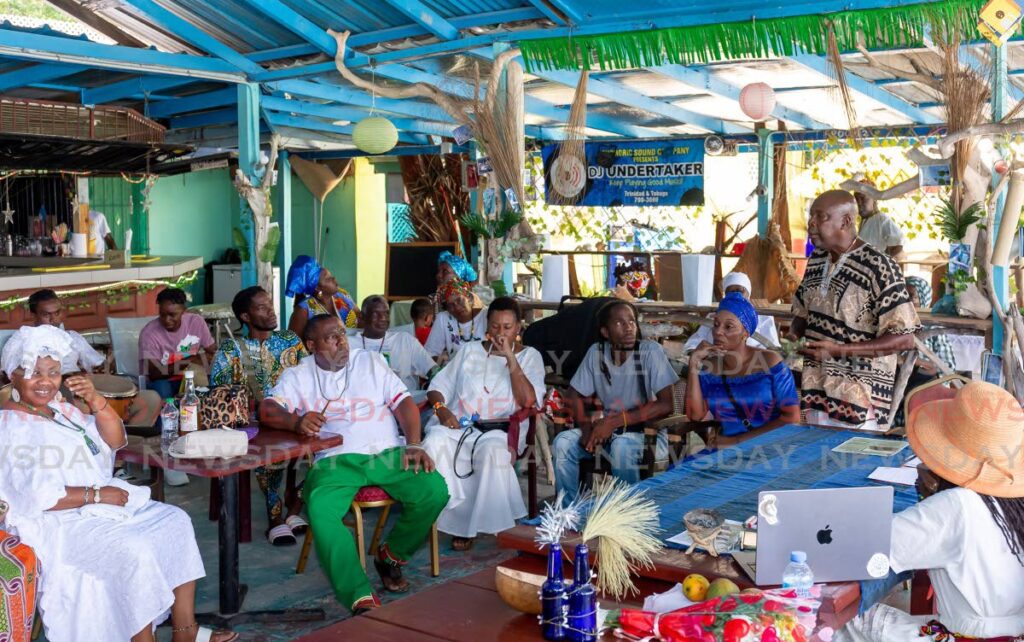CivilNET chair: 'We must decolonise spaces in Trinidad and Tobago'

CHAIR of Tobago CivilNET Rodney Piggott says the organisation is working closely with the Emancipation Support Committee to decolonise spaces in Trinidad and Tobago.
“We have spaces like Fort King George (overlooking Scarborough)…. one of the most beautiful places in Tobago and I have to call this man’s name. I have to pour libation every time I use their names. Where are my ancestors’ names on these places?” he asked on Saturday while addressing a group of African descendants at the 2nd Middle Passage Remembrance Day observance at Bago’s, Swallows Beach, Crown Point.
Piggott noted Picton Street, scene of some of the most “barbaric” acts in Port of Spain, was also named after an early coloniser.
“We don’t realise this but it is their ancestors we are revering every time we call their names. We are about decolonising these spaces.”
Last year, the government appointed a five-member committee to review the placement of statues, monuments and historical signage across the country.
Piggott told the gathering that Tobago CivilNET, since its inception, has addressed several matters interest, including internal self-government.
He said the group has also established committees to “bring all activities of the people of Tobago to the forefront of Tobagonians.
“Right now, the political scene dominates Tobago. Everything is politics and no one knows of anything else except politics.”
Saying the organisation also started a holistic health series on social media, Piggott said the fourth episode, which airs on June 21, deals with mental health.
“Sometimes we don’t think that a people itself can be sick, that the mentality of a people can be sick.”
Author and historian Sufia Giza, who is of Muskogee/Creek and Gullah heritage, introduced the first Middle Passage Remembrance Day last year, in Tobago, as part of a celebration throughout the African diaspora honouring the millions of slaves who perished during the treacherous journey.
Remembrance Day seeks to educate African descendants about the importance of acknowledging and respecting the sacrifices made by their ancestors.
The celebration has been taking place in Ghana, Panama and various parts of the US, including Brooklyn, New York, Oakland, California, Charleston, South Carolina and other locations.
Giza, who has been celebrating the Middle Passage in South Carolina for the 12 years, said she was inspired by the gathering at the event.
“We are growing from strength to strength,” she said.
Giza also showed an image on her laptop computer of an area behind the Scarborough Police Station where she learnt, African slaves disembarked when they came to Tobago. She is hoping next year’s Middle Passage observance can be held at that site.
Giza urged the gathering to trace their respective lineages.
“I could trace my lineage to black native Americans crossing Siberia 15,000 BC and I still have 52 per cent Nigerian. I could go back 11 generations. So when it comes to decolonisation that is the work that we have to do. We have to find who and whose we belong to and that is our strength.”
Ifa Rounke Diedre Prescod, who has authored three books, offered libations to several historically-recognised African liberators, who, she believes, paved the way for ensuing generations. They included former South African president and anti-apartheid activist Nelson Mandela; Black Jamaican nationalist Marcus Garvey; and civil rights leader Martin Luther King Jr.
Hazel Beckles Younglao also spoke. One of the highlights of the event was a drum procession from Bago’s to Swallows Beach.


Comments
"CivilNET chair: ‘We must decolonise spaces in Trinidad and Tobago’"